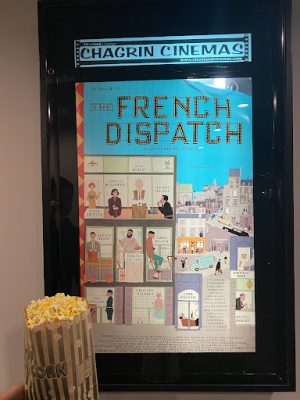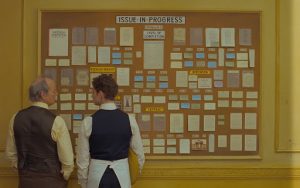Wes Anderson’s “love letter to journalism” – “The French Dispatch” review

Advertised poster of the movie French Dispatch
November 4, 2021
A true ode to journalism, “The French Dispatch” is unquestionably one of director Wes Anderson’s best pieces. It all starts in the fictional French town called Ennui-sur-Blase, where Arthur Howitzer Jr. (Bill Murray), falls in love with the petite town and decides to put an outpost of his American newspaper called Liberty Kansas Evening Sun, hence creating “The French Dispatch.”
The movie was structured around the founder, Howitzer, and the stories in “The French Dispatch,” from the first article published (page one) to the last article published, or in other words, Howitzer’s obituary (page 75). The storyline shifts from one story to another. There are four main storylines in the movie and each is written by a different journalist that works for Howitzer. The French Dispatch aligned with Wes Anderson’s other works, like “Fantastic Mr. Fox” and “The Royal Tenenbaums” because of his recognizable screenplay and unique footage.
In the first article, journalist Herbsaint Sazerac (Owen Wilson), takes the readers on a tour of Ennui-sur-Blase, pointing out the town’s quirks, popular hang-out spots and what a day looks like for a current resident. This part of the movie was great because it gave background information on the town and essentially set the mood of the movie. Owen Wilson, a re-appearing actor for Wes Anderson, did a fantastic job with his short but informative role.

The second article, written and presented by J.K.L Berenson (Tilda Swinton) was titled “The Concrete Masterpiece.” Set in the town prison, an art dealer is astonished by an incarcerated artist’s work. The artist, Moses Rosenthaler (Tony Revolori), is a painter in love with a prison guard and often reflects his work off of her. Thanks to the art dealer, Rosenthaler’s work was made popular and was in high demand by the residents of Ennui. Though his work was doing exceptionally well, Rosenthaler was suicidal and even tried to electrocute himself.
Three years go by and another grand piece of artwork is demanded from Rosenthal by the art dealer. The art dealer plans an event to reveal Rosenthal’s grand piece. After lots of anticipation, the grand piece is revealed at an art show in the prison, and to the dealer’s surprise, was painted directly on the prison walls and could not be easily transported.
After a literal brawl, an offer is made on Rosenthal’s piece and the whole wall was transported to the buyer’s plane. I thought this article was a great start to the movie. One thing that I really enjoyed about this segment is that the majority of this article was in black and white, but when a painting that Moses created was first shown, it changed into color. To me, this showed how much Moses loved Simon because his grand painting was a reflection of her.
The next article, called “Revisions to a Manifesto,” was written by Lucinda Kremetz (Frances McDormand). This article focuses on a teenage revolutionary war. The main character Zeffirelli (Timothee Chalamet) is both an accomplished chess-player and a young revolutionist in Ennui. Conflicted between his two romantic interests, Lucinda (Frances McDormand) and Juliette (Lyna Khoudri), Zaffirelli takes the readers on a comedic yet insightful journey up until his tragic death.
This article was my personal favorite because I thought that Timothee Chalamet did a remarkable job portraying a rebellious teen in his role. One other thing that I would like to note is the creative scenery, especially in this article. There were many great buildings and rooms with color schemes that were really appealing to the eye, typical for a Wes Anderson film.
“The Private Dining Room of the Police Commissioner,” by Roebuck Wright (Jeffrey Wright) is the last article that was published before Howitzer’s death. The article is supposed to be based around a chef and the meals that he makes, but obviously has some drama involved too.
In this article, Wright writes about a young child who is kidnapped from his home in the strange city of Ennui. The kidnappers take the child to their gang-house and lock him in a closet. Using morse code, the child asks for his personal chef to make him food. The Commissionaire and the child’s father (Matheiu Almaric), have the chef make a poisonous dinner to give to the kidnappers. But wait, what about the child, isn’t he going to get poisoned too?I think you should watch “The French Dispatch” to find out.
I thought this film was well thought out, and it left me on the edge of my seat. There was also a hint of animation which was an outstanding touch to the already great film.
The movie comes to an end when the journalists come together to write Howitzer’s obituary. One thing I noticed about the movie was that there was a big emphasis on the concept of loneliness. All the journalists and even some characters in the articles, mention that they are lonely in some shape or form. The French Dispatch journal is essentially a refuge for the lonely journalists to come together and disregard the feeling of being an outcast.

Even though the movie was outstanding, there were still some minor issues with this film. Furthermore, since this movie had so many intricate stories weaved into one grand movie, it’s extremely easy to miss a few important parts. Also, I often found myself racking my brain trying to understand the references that were being made. I definitely think you have to be used to Anderson’s style of movies to understand The French Dispatch. On the more positive side, the music, sound (example: recurring typewriter sounds) and the aesthetically pleasing scenery/settings made the movie one of a kind. Wes Anderson never fails to please the eye with his colorschemes and specific placements in his films.
As Howitzer would say, “Try to make it sound like you wrote it that way on purpose,” I really think that the specific details and perfectly executed acting was meant to be put in The French Dispatch. Wes Anderson outdid himself on this one.
